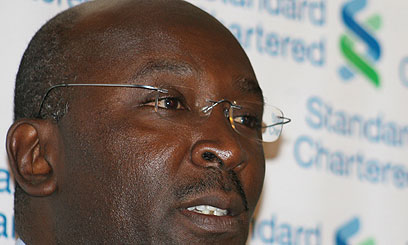NAIROBI, Kenya, Feb 6 – A top banker has called on Members of Parliament to fast track passage of the Banking Amendment Act saying it will help seal loopholes that are exploited by unscrupulous people.
Standard Chartered Kenya Chief Executive Officer Richard Etemesi told a panel of MPs investigating the decline of the shilling that the Kenya Bankers Association (KBA) was proposing a review of the Act that would strengthen the banking environment.
“If those amendments are passed, they would take away some these opportunities that exist in the current legislation and the loopholes that people who do not have the interests of this country at heart can take advantage of,” he said of the proposals that KBA would like to see in the Banking Act.
The proposals by the association are meant to counter those that are being suggested by MPs and which have led to the delay in the passing of the Finance Bill 2011.
The suggestions by the lawmakers include capping of interest rates to protect borrowers from the high lending rates as well as the need to fix the minimum rate of interest that banks or financial institutions must pay on deposits held in interest-earning accounts.
However, the legislators supporting the introduction of laws to control interest rates have been vocal and have maintained that they would not pass the Finance Bill until ‘people-friendly’ amendments are made.
Etemesi spoke when he appeared before the select committee on the decline of the shilling where he had been summoned after failing to honour two invites by the MPs.
During the session, the Stanchart boss argued that the rapid depreciation of the local unit which saw it touch a low of Sh107 against the dollar was not triggered by malpractices but largely by external factors that were beyond the control of the banks and the Central Bank of Kenya (CBK).
He seemed to defend CBK Governor Prof Njuguna Ndung’u who has come under fire for being slow to intervene and save the currency saying there were various factors that worked against him (governor).
“2011 was a unique year and no Central Bankers everywhere. I don’t think there is any Central Bank that has come out unscathed because of the turbulences in the macro economic space,” Etemesi added.
He however acknowledged that when the crisis hit, there was a lack of clear and cohesive policy direction that could have helped to arrest the situation.
In addition, he opined that contrary to popular belief, the regulation in the sector was strong and had only been shaken by the myriad shocks in the economy.
Nevertheless, the stability in the macro-economic environment did contribute somewhat to the volatility in the exchange rate, he pointed out.
Due to the low interest rate regime that had been enjoyed in the country over the last five years he argued, there was an insatiable demand for credit that saw Kenyans take to ‘living beyond their means’.
“We saw a huge variance in domestic consumption and foreign exchange deficit although the country total exports remained at the same level while the imports grew by at least a third. This meant that something had to give and this was the shilling,” he emphasised.
Asked whether Stanchart benefited in any way from the devaluation of the currency, Etemesi vehemently denied the assertions saying on the contrary, the bank was a net seller of dollars at the time the shilling was plummeting.
In addition, while admitting to holding huge forex reserves, he clarified the bank held the money on behalf of its clients.
“For example if you came and deposited your dollars with us we would open a foreign currency account but because we can’t hold the dollars here (in Kenya). We take them and hold them with Standard Chartered in London,” he explained.
Given all these factors, Etemesi concluded, the bank could not have been involved in currency speculation as it was being alleged.
The Stanchart boss was the last witness to appear before the committee which is due to prepare its report on what could have caused the local unit to lose about 26 percent of its value in a span of few weeks, by Saturday this week.



































